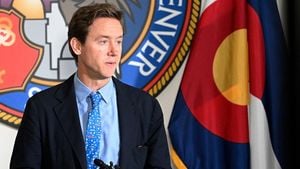On November 26, Pakistan witnessed monumental unrest as thousands of supporters of former Prime Minister Imran Khan stormed the capital, Islamabad, demanding his release from imprisonment. The protests, marked by violence and clashes with law enforcement, ignited concerns of rising extremism and governmental instability within the nation.
The chaos erupted as the Interior Ministry confirmed the deployment of military forces to secure Islamabad's heavily fortified Red Zone, where key government buildings and foreign embassies are located. Prime Minister Shehbaz Sharif, condemning the protests, stated, "It is not a peaceful protest. It is extremism," and pointed to the loss of lives among security personnel as evidence of the situation's dire nature. Specifically, four security officers were reported dead due to incidents during the protest, with additional casualties among demonstrators.
Influenced by heightened tensions, the Pakistani government had already enforced roadblocks, including shipping containers aimed at preventing protesters from entering the city. Despite these precautions, Khan's backers managed to break through, leading to confrontations marked by tear gas use on both sides. Local residents reported the capital turned chaotic, with many confined to their homes due to the unrest.
The protests were prominently led by Khan’s wife, Bushra Bibi, alongside close aide Ali Amin Gandapur. Their defiance culminated with supporters reaching D-Chowk, a strategic and symbolic location near the Parliament. According to reports, this area saw severe clashes, resulting not only in skirmishes but also instances of vandalism, including the lighting of police kiosks on fire.
While the opposition party, the Pakistan Tehreek-e-Insaf (PTI), sought to maintain the narrative of peaceful assembly, they faced accusations of instigated violence. Bukhari, PTI spokesperson, claimed the government was wielding undue force against peaceful protesters, urging rights organizations to intervene.
Compounding this was Imran Khan's prolonged incarceration. Since being ousted through political maneuvering involving military influences nearly two years ago, Khan has grappled with over 150 criminal cases ranging from corruption to inciting violence—charges widely viewed by his supporters as politically motivated. Even from behind bars, Khan, now 72, consistently calls upon his followers to persist with their protests until their demands for his release and governmental resignations are fully realized. "We will not back down until our demands are met," he stated from jail, highlighting the stakes involved for both protesters and the ruling authorities.
Political analysts express disdain about the situation potentially spiraling out of control. Analysts like Zahid Husain caution against direct military involvement, noting, "If the army is going to crush the protesters, then the situation will be beyond their control and things will be worse." This echoes sentiments shared by legal expert Osama Malik, who voiced concerns about potential military intervention, particularly if protesters turn violent.
Supporters rallying for Khan have asserted their willingness to endure hardship for their leader, with many proclaiming they would "die for Khan". This passionate rhetoric underlines the stark loyalty within his base—an element of the political tension underscoring the relevance of Khan's enduring popularity, even amid legal and political battles.
Despite the growing unrest and extreme governmental measures, PTI insists it will not relent until Khan is freed. The energy displayed during the protests sends signals of the underlying dissatisfaction influential to Pakistani politics. A substantial section of the populace remains convinced Khan's leadership would herald positive change, amid growing disillusionment with the current government's stability and its handling of the situation.
Given the chaotic scenes observed and the strategic importance of areas like D-Chowk, the prospect of extended protests looms ominously over Islamabad and beyond. The overarching sentiment is one of discontent—dissatisfaction with perceived injustices and imposition of authority by the current administration. The structural conflicts between the military, government, and Khan's resurgent political force epitomize the volatility intrinsic to Pakistan's political climate.
This juncture reflects not merely dissatisfaction with Khan’s imprisonment but serves as a critique of broader governmental policies and alleged electoral frauds—all elements driving Khan's supporters to the streets. Calls for Khan's release and the dissolution of perceived corrosive measures against the judiciary expose cracks within the supposed stability of the Pakistani state.
The culmination of these events will likely impact how the military and government respond to mounting pressure, both from within the populace demanding reforms and internationally, amid growing concerns about human rights and the stability of governance.
Perhaps the most definitive takeaway from these protests is the illustration of public fervor generated around Imran Khan. His calls for unity and persistence resonate powerfully with supporters, reflecting the continuing influence of personality-driven politics within Pakistani society.
With tensions high and the potential for future mobilizations eminent, the coming days could yield pivotal developments—determining not only Khan's fate but the operational integrity of Pakistan's political structure under siege.



